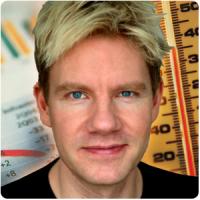“Skeptical Environmentalist” Bjorn Lomborg is back with a new book, Cool It: The Skeptical Environmentalist’s Guide to Global Warming, another attempt to distract people from the issue by burying it in a confusing and irrelevant economic trap.
Lomborg argues that climate change is happening and that the consequences may ultimately be dire, but says, “It’s just not in the nature of the political process to say we’re going to do something now to solve a problem later on. So instead of saying, ‘Let’s do something that feels good right now,’ let’s try and think of what we could do that will do good now.” He then suggests that we throw a little money to climate change research but spend most of our (zero-sum?) resources at other problems, like AIDS and malaria.
This, as with so much of what Lombog says, sounds reasonable as he says it, but is entirely silly when you sit down and think about it. First of all, it’s entirely in the nature of the political process to hire firefighters, even at a time when no homes are burning. There is no reason to abandon long-term risk analysis and planning just because (some) political processes and practitioners are short-sighted.
Second, while it makes perfect sense to address AIDS, malaria AND climate change, it’s also worth remembering that two of these three threats can be avoided (by practicing safe sex or lathering up with DEET and staying indoors on hot tropical evenings). Climate change, on the other hand, is lurking in all of our futures with consequences that will be unavoidable and potentially devastating for the entire planet. Lomborg’s happy list of potential “benefits” is – like everything else he writes – a distraction based on wishful thinking rather than research.
This Salon.com interview gives Lomborg every opportunity to make his points while at the same time subjecting him to logical scrutiny. The darling of the Climate Change Confusion movement doesn’t stand up very well.
Subscribe to our newsletter
Stay up to date with DeSmog news and alerts







